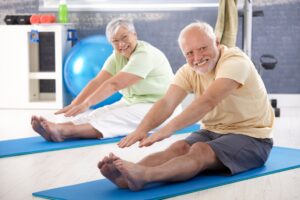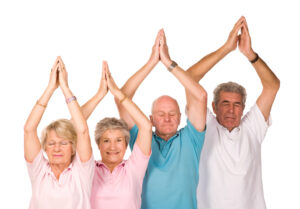
In the Observer Magazine at the weekend, there was a small after-thought type article entitled ‘Exercises to help avoid an early death’.
While the threat of an early death is a bit strong, I thought it might be a good idea to reiterate just how good for us different forms of exercise can be.
Why do we exercise?
First a reminder about the general benefits of exercising regularly. This is not just to avoid an early death. It helps ensure you can lead a lifestyle that is as active, healthy and illness injury-free as possible.

Regular exercise has a huge impact upon the important systems that keep our bodies functioning. Cardio-vascular or aerobic exercise helps the muscles of the heart to stay strong. It also helps the lungs to work efficiently. Those two things combine to send oxygenated blood around the body efficiently.
Resistance to an early death
Strength and conditioning exercises will keep muscles toned and bones strong. These can be with or without weights. As we get older, from our 30s onwards, we naturally lose some muscle mass and bone density. By exercising regularly, we slow that process so that bones and muscles retain their strength and density for longer.
Activities that test our flexibility, such as stretching, Yoga and Pilates are all great. They keep our muscles, ligaments and tendons moving easily and staying loose.
There are many more forms of exercise and associated benefits, all of which can be read about in more depth on this website. Today’s blog, however, is a whistle-stop tour of the benefits of exercise. It provides a reminder as to why we don our lycra and hit the gym. And it is important to note that it is not simply to avoid an early death. Exercise also brings with it the ability to release feel-good hormones and stress-reducing hormones – so our mental health as well as our physical well-being benefits from regular exercise.
Five ways to avoid an early death
So what does the author, Gregory Robinson, recommend in his article to help us avoid an early death?
Running: Research published by the British Journal of Sports Medicine has said that regular running will reduce the risk of illness later in life. It doesn’t matter how far or how fast you run, it is simply the act of regularly running. The research is based on 14 previous studies, taking in a wide range of participants. The message is simple: put on your running shoes and just do it.
Swimming: Swimmers have been found to have a 41 per cent lower risk of death as a result of stroke or heart disease according to a study by Swim England, the sport’s national governing body. It also helps older people to stay mentally and physically fit and is a safe form of exercise for people who cannot do exercise involving high impact.
Playing sport is a great way to stay fit
Tennis: Playing a game such as tennis on a regular basis can reduce the risk of an early death by up to 47 per cent. The article doesn’t explain why this is, but we conclude it is because tennis combines many fitness elements. These include aerobic and anaerobic exercise and strength and flexibility. It is also a stress-reducing exercise so will help mental well-being too.

Yoga: As an activity, Yoga improves strength, breathing and flexibility. It has also been found to reduce risk factors for heart disease such as high body mass index, high cholesterol and high blood pressure. Yoga is best combined with aerobic exercise such as running, cycling and swimming.
Brisk walking: Sitting for too long is seriously bad for your health. Walking is the easy antidote to this. Regular, short, brisk walks during the working day will mitigate many of the health risks associated with long periods of sitting. Incorporate walking into your office life by changing behaviours. For example, always take the stairs, not the lift; walk to your colleague’s desk rather than emailing from your desk; if you make a phone call, walk and talk.
By combining all of these activities in regular exercise routine, hopefully you will not only avoid an early death but live a happy, less stressed and active life.







